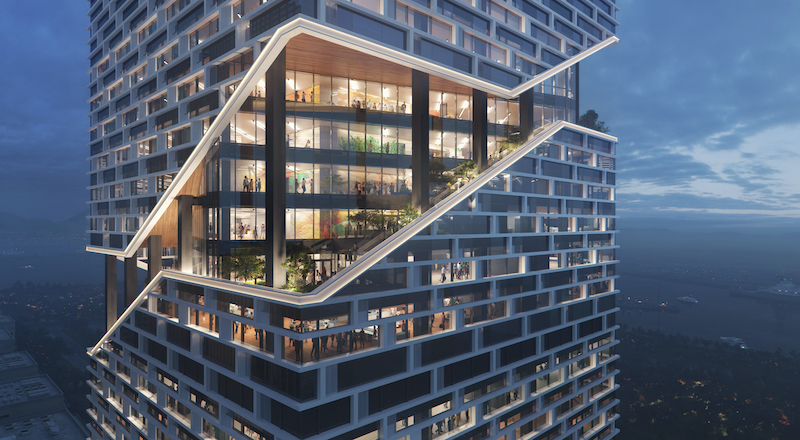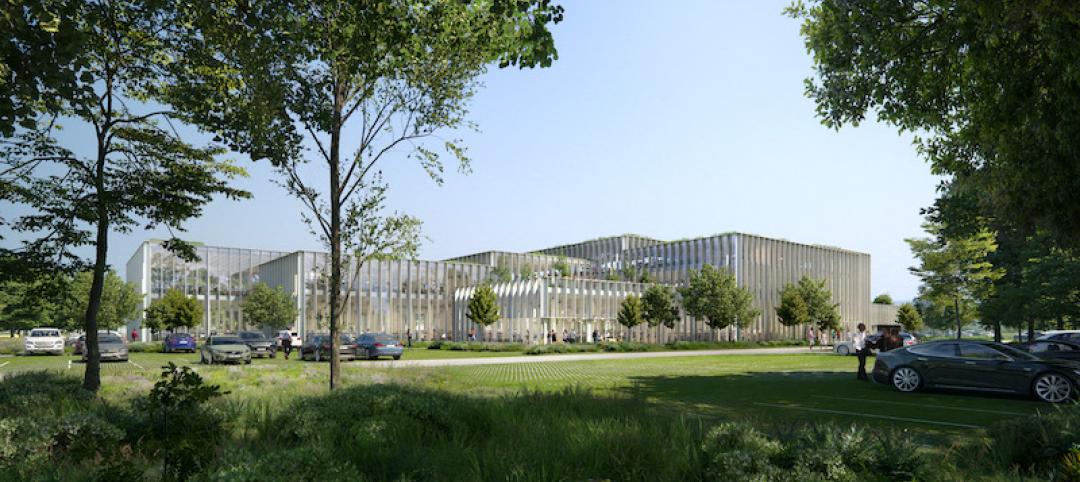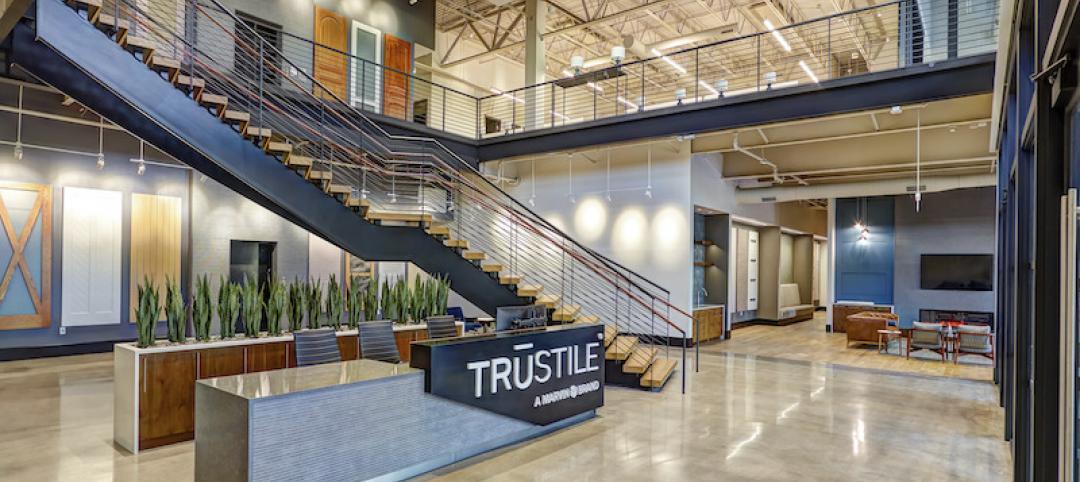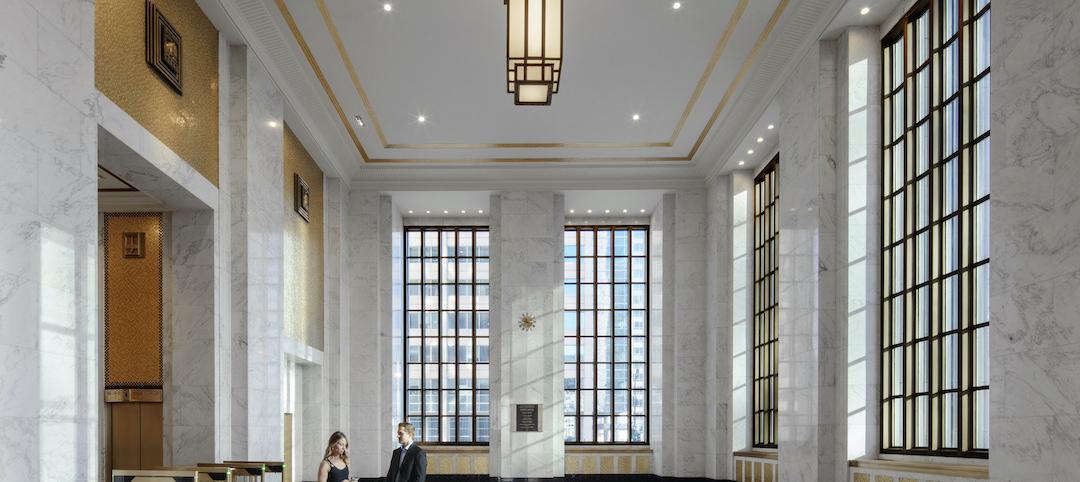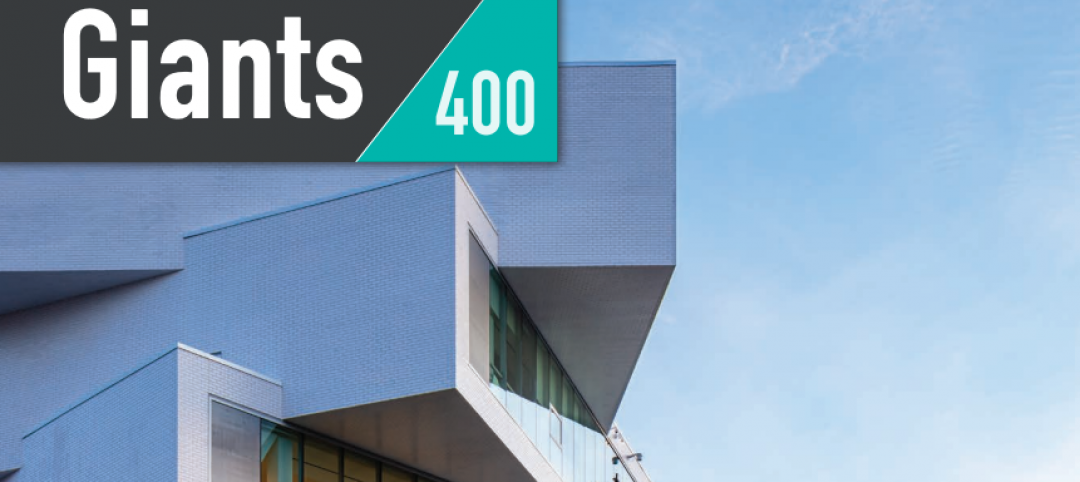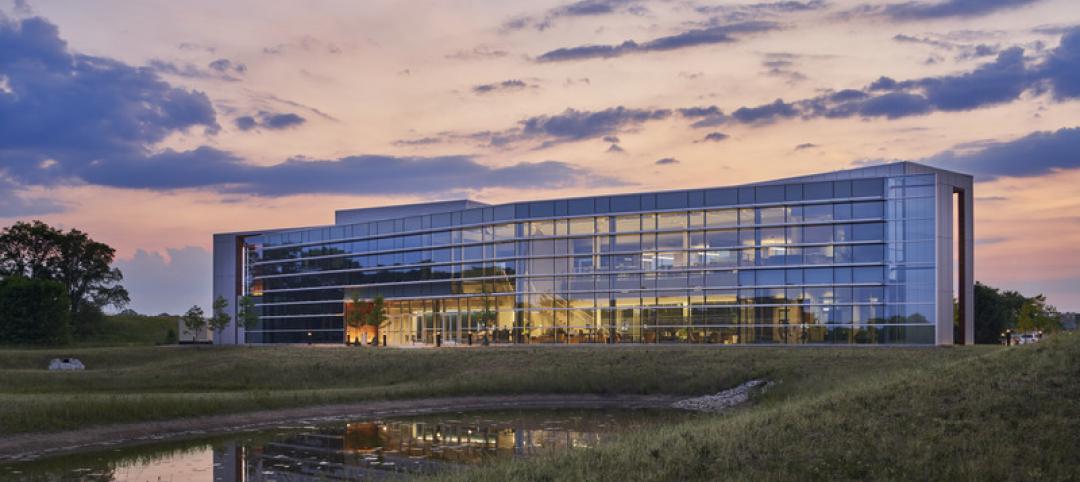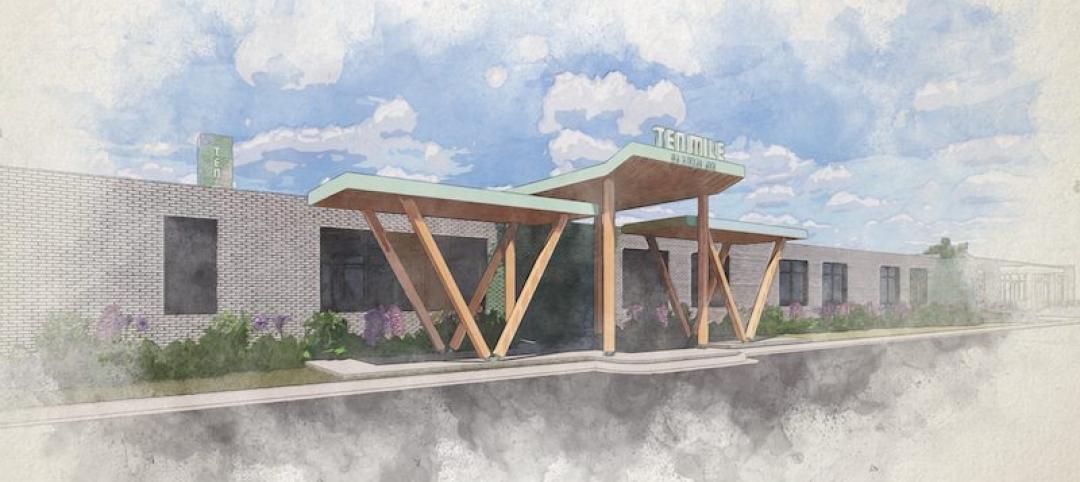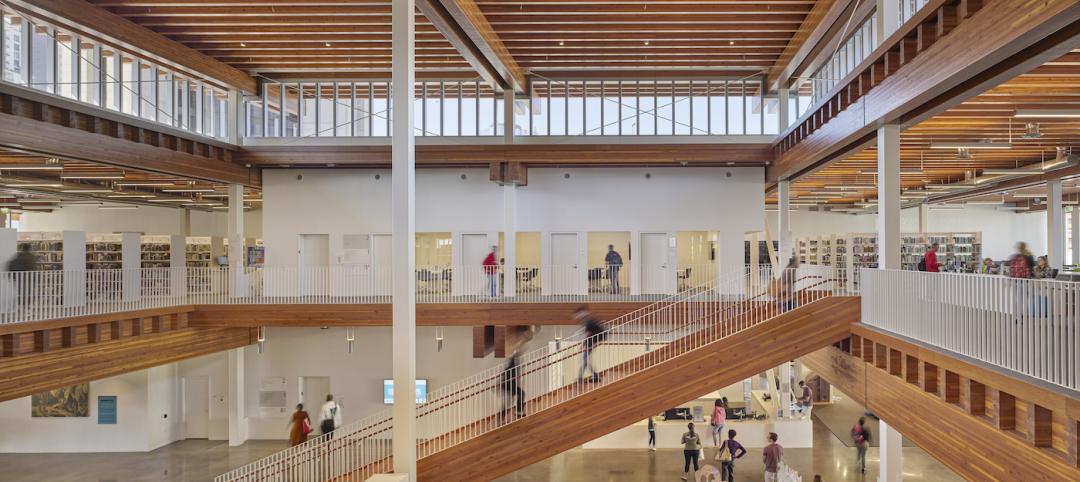Construction began last month on the new corporate headquarters for vivo, a fast-growing China-based tech and smartphone provider. The building is scheduled to be substantially completed in the fall of 2025, when it will include as part of its amenities package indoor-outdoor gardens on every one of its levels.
The 32-story, 97,000-sm tower, which will soar 150 meters in the Bao’an district of Shenzhen, China, will feature gardens that ascend, in a spiral design, alongside a health- and wellness-focused work environment.
“We know that today’s workers thrive in ‘whole life’ environments that integrate nature, health and work. Our design is the physical embodiment of that ethos—fluid, sustainable, and center[ed] around the wellbeing of those who use the space,” says Robert Mankin, Partner in charge of workplace design at NBBJ, the design architect on this project.
GARDENS WILL EVOKE CHINA’S BIO-DIVERSITY
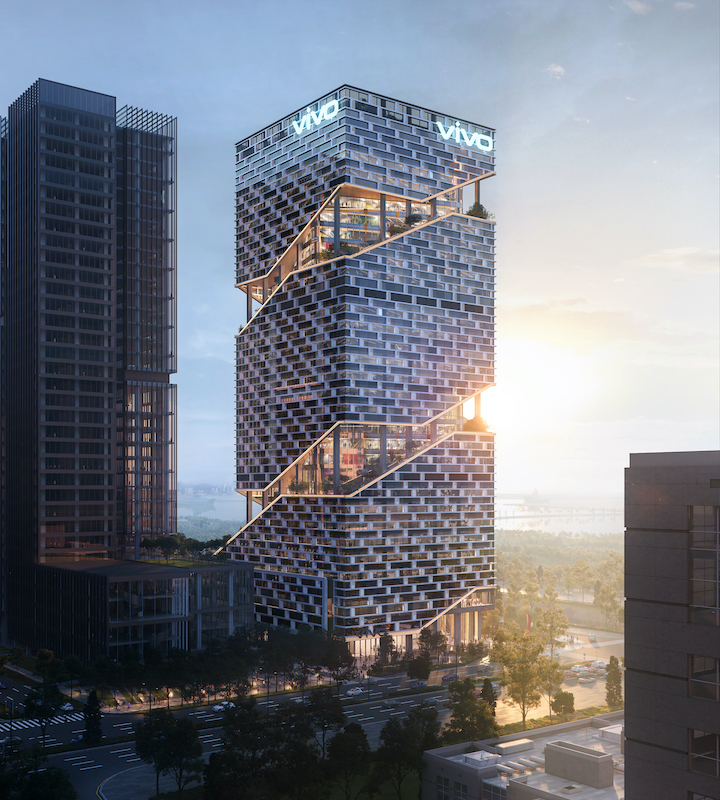
The building, scheduled for completion in 2025, will rise 150 meters.
Along with NBBJ, the Building Team includes Atkins (sustainability consultant), InHabit (façade consultant) BPI (lighting consultant), CADG (landscape), and WSP (vertical transportation). The local AE team is overseen by Tongji Architectural Design, whose scope includes construction drawings, as well as structural and MEP engineering.
The building’s green spaces move from a ground-level plaza with retail through the tower, where they transition to evoke the diverse biomes found in Southeast China, from coastal wetlands and lowland forests to subtropical and alpine forests.
Also see: A Poland firm takes vegetative façade to a new level
The building is designed to achieve WELL and LEED Gold certifications. To protect against rising flood waters due to climate change and typhoons, NBBJ has proposed sustainability features that include permeable surfaces and landscaping for drainage back into the ground.
Rainwater will be captured in underground tanks and reused.
WORKPLACE ZONES GET FULL EFFECT OF GARDENS
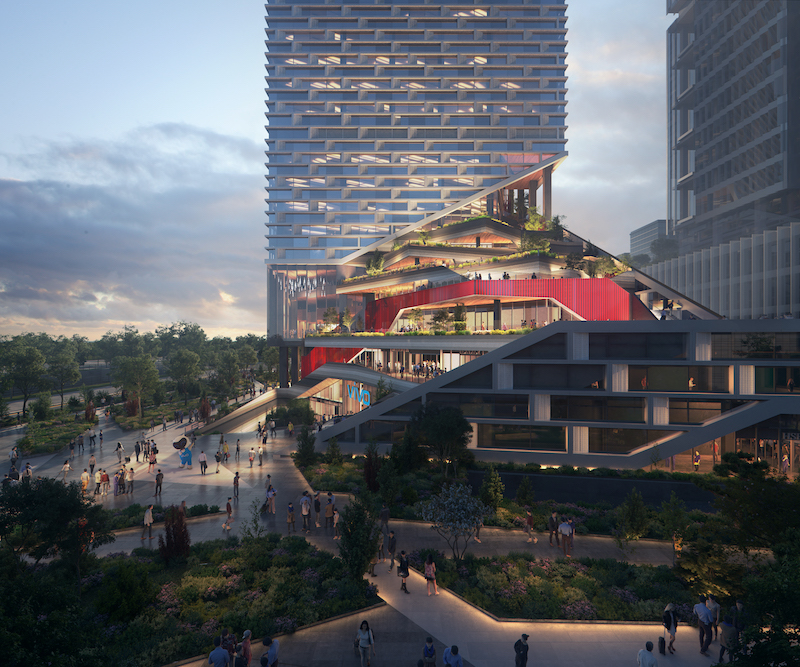
The gardens on the first four above-ground floors will be connected, and lead to a collection of gardens and terraces on the middle floors.
Since the outdoor gardens spiral up and change location on each level, “we developed a smart and systematic planning strategy to zone the workspaces so they get the most of the gardens,” explains Vivian Ngo, a Principal and one of NBBJ’s architects on this project, in written responses to BD+C’s questions.
So pantries will always be adjacent to the gardens as a starting point, with workspaces shifting around on each level. Ngo notes that, in a typical office plan, the core is usually the starting point.
To minimize columns, some of the outdoor garden spans are quite large, says Ngo. The structural engineering ensures that the garden zone has enough capacity for planting soil and enough clearance in the floor below without additional columns.
Furthermore, in typhoon-prone Shenzhen, the outdoor elements in these high-rise gardens, such as plant species and exterior doors, will need to withstand storms.
CLIENT LOOKS BEYOND CONSTRUCTION COST
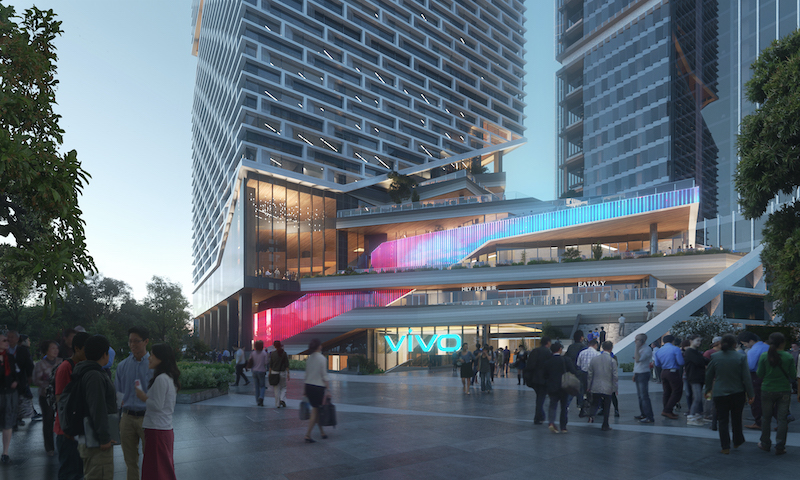
A welcoming street-level plaza will include retail.
Ngo says that the design team considered whether to connect the gardens throughout the entire building, so that occupants could walk from level 5 (the first floor above parking) to level 32 uninterrupted. The team ultimately decided, for efficiency sake, to connect the first four floors with gardens on the same side, as one unit.
The building will coil upward to The Atrium—a collection of terraces and gardens at the building’s middle levels—before finishing at the penthouse area that offers event space, conference rooms, and a view of Qianhai Bay.
Ngo says that while the building was designed before the coronavirus was declared a pandemic last March, its connecting stairs “could help decrease elevator use when traveling short distances between levels.”
The area of covered outdoor space counts toward the building’s gross floor area, or GFA, according to local codes. That’s an added cost, explains Ngo, and somewhat contrary to traditional real estate development economics. “However, the client was very open-minded,” she says, in its support of the outdoor garden design and its promise of unique wellness and productivity benefits “to create value beyond what can be measured in dollars or yuans.”
Related Stories
Office Buildings | Jan 12, 2021
Epic Games purchases North Carolina mall to convert into new HQ
The video game company is currently valued at over $17 billion thanks to Fortnite, its massively popular battle royale game.
Architects | Jan 5, 2021
Ware Malcomb finds itself in the mix for multiple diverse projects
Its latest completion is an office/factory/warehouse combo for one of Marvin Window’s brands.
Giants 400 | Dec 16, 2020
Download a PDF of all 2020 Giants 400 Rankings
This 70-page PDF features AEC firm rankings across 51 building sectors, disciplines, and specialty services.
Giants 400 | Dec 3, 2020
2020 Office Sector Giants: Top architecture, engineering, and construction firms in the U.S. office building sector
Gensler, Jacobs, and STO Building Group head BD+C's rankings of the nation's largest office building sector architecture, engineering, and construction firms, as reported in the 2020 Giants 400 Report.
Government Buildings | Nov 25, 2020
New Indiana Toll Road headquarters creates unified environment for staff
New LEED Gold facility consolidates operations for tollway authority.
Smart Buildings | Nov 20, 2020
The Weekly show: SPIRE smart building rating system, and pickleball court design tips
The November 19 episode of BD+C's The Weekly is available for viewing on demand.
Office Buildings | Nov 17, 2020
Former elementary school becomes modern office space in North Charleston
The Middleton Group is designing the project.
Government Buildings | Nov 13, 2020
Tax shortfalls nip government projects in the bud
Federal contracts are proceeding, but states and cities are delaying, deferring, and looking for private investment.


